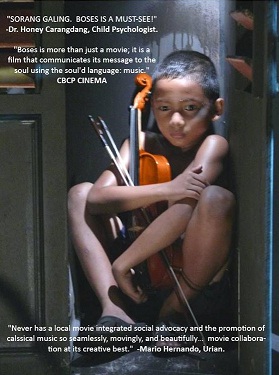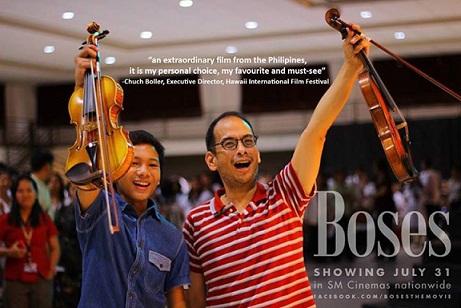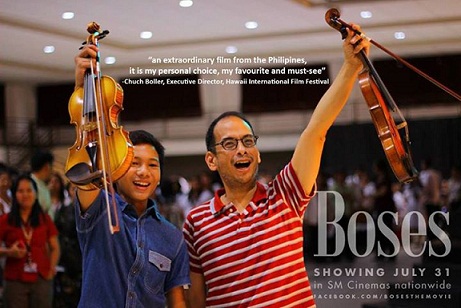By PABLO A. TARIMAN
THE real-life stories of the country’s leading artists past and present are rich goldmine for cinema materials.
It is a sad observation that mixing classical music and cinema – at least in the Philippines – is deemed not a good combination at the box office.
In the mid-80s, the late filmmaker Marilou Diaz-Abaya started shooting a film on classical musicians with the likes of Richard Gomez, Dina Bonnevie and Charito Solis playing the roles of violinist, pianist and soprano, respectively. Real life tenor Noel Velasco was supposed to be in it.
When the producer heard an operatic aria while viewing the rushes, she was horrified by the sound.
“Is that part of the film?” she asked Abaya.
“Yes po,” she replied.
The film was promptly shelved.
 One is reminded of this episode as one viewed the homecoming screening of Ellen Ongkeko Marfil’s “Boses” in the ongoing Cine Malaya Independent Film Festival at the CCP. Believe it or not, the film is now enjoying commercial run in SM Cinemas.
One is reminded of this episode as one viewed the homecoming screening of Ellen Ongkeko Marfil’s “Boses” in the ongoing Cine Malaya Independent Film Festival at the CCP. Believe it or not, the film is now enjoying commercial run in SM Cinemas.
On the whole, the film is a good introduction to the violin as violinist Ariel Basco (played by real life violinist Alfonso “Coke” Bolipata) comes face to face with an abused child, Onyok, played by Julian Duque.
On this note, there is no doubt that “Boses” is an eye-opener for classical music.
The most commendable part of it is that the film has a powerful story to justify its use. Screenwriters Froi Medina and Rody Vera have woven an interesting story on a violinist recovering from the death of his violin protégé who happens to be his love partner as well.
On the other hand, the moviegoers are introduced to an abusive father (superbly played by Ricky Davao) who thinks music has no place in their poor, wretched existence.
(Which brings us to the observation that the most common reasons why young people avoid a course in music is that it is always perceived as a wrong course for earning a living.)
All at once, the film gives you a real-life scenario where music isn’t just for hobby listening but it can actually be pursued, nurtured and studied as part of life itself.
It is refreshing to watch a film where a grand piano and music scores form part form part of the set and relatively unpopular composers like Bartok and music schools like the famous Juilliard in New York figure prominently in the screenplay.
But then again, the film’s most notable asset is its poignant story directed with sensitivity by Marfil. Ricky Davao has no equal as a character actor and you feel this as you find yourself hating the character after the screening. This is not one of Cherry Pie Picache’s most challenging roles but still she gave the part an unusual weight as she delineates the difficult job of an administrator of the home of abused children. Meryl Soriano as Bolipata’s love interest has brief but memorable frame.
 On the other hand, it is possible Bolipata is playing himself in this film as he gives the moviegoers an idea of his caliber as real life instrumentalist. You hear his fairly good rendition of Massenet’s overly popular violin music from the opera, “Thais.”
On the other hand, it is possible Bolipata is playing himself in this film as he gives the moviegoers an idea of his caliber as real life instrumentalist. You hear his fairly good rendition of Massenet’s overly popular violin music from the opera, “Thais.”
To be sure, the music tended to over-dramatize the story but then again it is the only music where moviegoers can easily connect with the characters and their story.
The gem of a young actor in this film is Julian Duque who plays the abused child. The face all at once elicits piety and the fact that he has to act without dialogue made him an even more astounding actor in this film.
Playing a section from Vivaldi’s “Four Seasons” with his true-to-life mentor Bolipata in the film’s finale, Duque is a real acting find and a natural one at that.
One notes that Duque was soloist in the same piece with the Pundaquit Virtuosi and the Philippine Youth Symphonic Band in one concert where the main attraction was pianist Cecile Licad in Beethoven’s Piano Concerto No. 2 in B Flat Major, Op. 19. It was the same year (2008”) “Boses” was shot.
Marfil’s film is a brave one indeed and it is to her credit that she was able to wield the story of man’s inhumanity to his own son with the powerful strain of classical music which alas, figures in Filipino films once in a blue moon.
